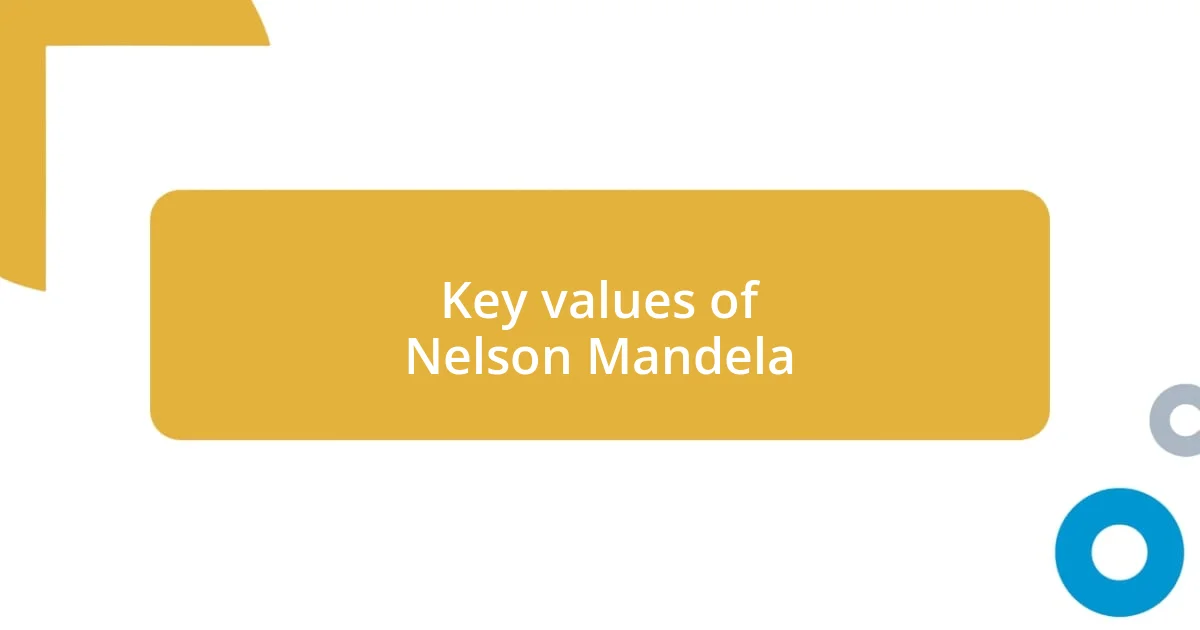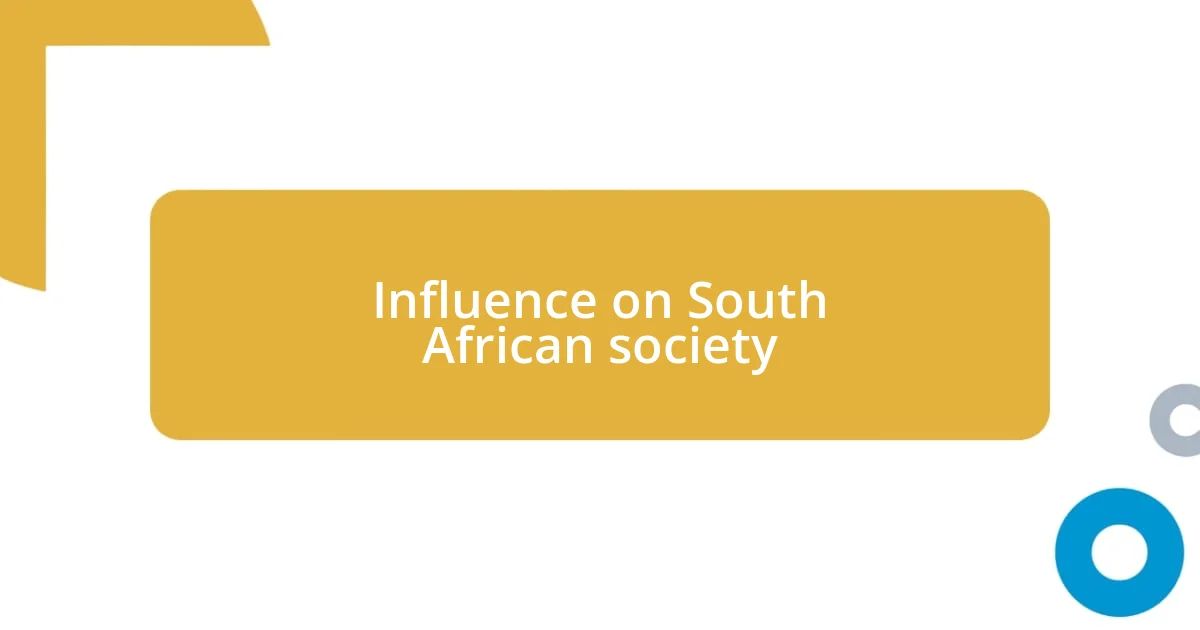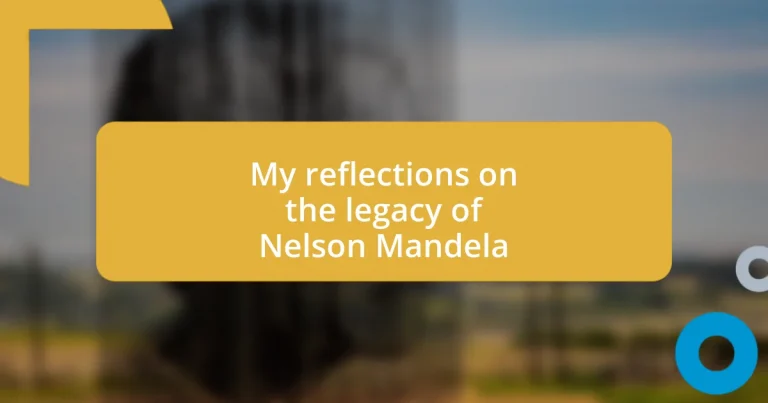Key takeaways:
- Mandela’s leadership and commitment to forgiveness and reconciliation transformed South Africa, emphasizing unity and empowerment through education.
- His legacy inspires global movements for justice, prompting individuals and businesses around the world to adopt social responsibility initiatives.
- Key lessons from Mandela’s life include the power of resilience, the importance of service over power in leadership, and the significance of storytelling in fostering understanding and connection.

Understanding Nelson Mandela’s significance
Nelson Mandela’s significance, to me, lies not just in his political achievements but in his unwavering commitment to human dignity. I remember reading about his 27 years of imprisonment and how he emerged not filled with bitterness, but with a vision of reconciliation. Isn’t it remarkable how he transformed personal suffering into a catalyst for collective healing?
Reflecting on his leadership, I can’t help but admire his ability to inspire hope amid despair. When he became South Africa’s first Black president, it wasn’t just an electoral victory; it was a historical moment that symbolized the triumph of justice over oppression. I often wonder, how much courage it takes to forgive those who once oppressed you and lead a nation towards unity?
Mandela also taught us the importance of education as a transformative tool for empowerment. I recall a poignant quote of his that resonated deeply with me: “Education is the most powerful weapon which you can use to change the world.” It prompts me to think—how often do we overlook the potential within our communities to create change through learning and understanding?

Key values of Nelson Mandela
Nelson Mandela’s core values were deeply rooted in humanity. Throughout my life, I’ve encountered numerous leaders, but Mandela’s profound belief in forgiveness and reconciliation has always struck a chord with me. I remember discussing his legacy with friends during a gathering, and we all agreed that his ability to rise above resentment taught us the invaluable lesson of empathy. His values reflect a resilience that encourages us to look beyond our differences, something I strive to embody in my own relationships.
Here are some key values that defined Nelson Mandela’s legacy:
- Forgiveness: He showed that letting go of past grievances can pave the way for peace.
- Equality: Mandela championed the belief that everyone deserves equal rights and opportunities, regardless of their background.
- Courage: His readiness to stand up against injustice, even at great personal cost, inspired countless individuals.
- Unity: He emphasized the importance of coming together as a collective for a greater cause, transcending individual interests.
- Education: Mandela valued education as a means of empowerment and personal transformation, urging others to embrace knowledge as a tool for change.

Influence on South African society
Mandela’s influence on South African society is palpable in the way communities embraced the idea of unity after years of division. I vividly recall attending a local event celebrating Freedom Day, where people from all backgrounds came together. It struck me how Mandela’s vision of reconciliation had deeply permeated society, inspiring individuals to not only recognize their differences but also to celebrate them in harmony.
It’s fascinating to observe how his legacy has forged a path for political activism among the youth. Just the other day, I spoke with a young activist passionate about social justice. She told me how Mandela’s story ignited her determination to bring change to her community. This generational shift isn’t just about remembering Mandela; it’s an active movement that continues to redefine the South African landscape.
Moreover, businesses today are increasingly adopting social responsibility initiatives influenced by Mandela’s ethos. I remember when a local company launched a program aimed at improving education in underserved neighborhoods. This wasn’t just corporate philanthropy; it was a direct reflection of Mandela’s belief in education as a tool for empowerment. The ripple effect of his teachings continues to nurture a society striving for a more equitable future.
| Aspect | Description |
|---|---|
| Unity | Communities coming together to celebrate diversity and promote harmony. |
| Activism | Young leaders inspired by Mandela’s legacy drive social change initiatives. |
| Corporate Responsibility | Businesses implement programs that reflect Mandela’s educational beliefs. |

Global impact of Mandela’s legacy
Nelson Mandela’s legacy extends far beyond South Africa, echoing across the globe and inspiring movements for justice and equality. I once attended an international conference where delegates shared their struggles for human rights, and it was moving to witness how many cited Mandela as their guiding light. His story transcends borders, stirring a collective sense of responsibility that drives individuals to action, urging them to embody the spirit of advocacy and resilience he so brilliantly personified.
Reflecting on my own experiences, I remember reading about a protest in India that honored Mandela’s fight against apartheid, where people marched with signs emblazoned with his famous quotes. It was a vivid reminder of how his commitment to equality and unity resonated with those facing oppression worldwide. In that moment, I could feel the shared heartbeat of communities coming together, fueled by a common belief in the power of change. How often do we find ourselves motivated by someone we admire to take a stand? For many, Mandela is that catalyst.
Moreover, I’ve come across instances where businesses worldwide have adopted Mandela’s principles into their corporate missions. A notable example was a tech company that implemented an initiative supporting education for underprivileged youth globally, inspired by Mandela’s vision of empowerment. It’s fascinating to see how his ideals spur corporate responsibility, leading to a culture of giving back and fostering change. This raises an important question: Can we really honor Mandela’s legacy without letting it inspire our actions in the communities we care about? I believe the answer lies in how we choose to integrate his values into our daily lives, creating a ripple effect that pursues justice and equality for all.

Lessons learned from Mandela’s life
Reflecting on Mandela’s life, one of the most profound lessons I’ve learned is the power of resilience. His ability to endure 27 years of imprisonment, while never losing sight of his vision, has always inspired me. I remember a time when I faced a setback during a community project. In that moment of struggle, I could hear Mandela’s voice in my head, reminding me that true strength lies in perseverance. His journey teaches us that challenges are simply stepping stones toward achieving our goals.
Another critical lesson is the importance of forgiveness. Mandela’s willingness to forgive his oppressors is a testament to his character. I’ve often thought about this during conflicts in my own life. When I tried to reconcile with an old friend after a significant fallout, I was reminded of Mandela’s approach. By choosing reconciliation over revenge, I found peace and a renewed bond, echoing Mandela’s philosophy that healing comes from understanding rather than resentment. Isn’t it fascinating how one person’s choice can ripple out and influence countless others?
Lastly, Mandela exemplified the idea that leadership is about service, not power. I recall a moment while volunteering at a local shelter, feeling overwhelmed by the needs around me. Inspired by Mandela, I realized that leadership isn’t about being in charge; it’s about uplifting others. This perspective shifted my approach to helping—turning my focus toward serving and empowering those in my community. How can we truly lead if we don’t prioritize the needs of those we aim to serve? Mandela’s legacy challenges us to rethink our understanding of leadership, urging us to cultivate a spirit of selflessness in our everyday lives.

Continuing Mandela’s vision today
Continuing Mandela’s vision today requires us to actively engage in our communities and advocate for those who cannot speak for themselves. I remember volunteering at a local youth center where I saw firsthand the impact of mentorship. Inspired by Mandela’s belief in education as a tool for liberation, I worked with young people to help them realize their potential. How can we expect to build a better future if we don’t invest in our youth today?
I often reflect on Mandela’s emphasis on unity in diversity. During a recent neighborhood event celebrating different cultures, I was struck by the pride and joy in everyone’s eyes. It reminded me how vital it is to promote inclusivity and respect for all. What if we all took a moment to foster understanding among one another, regardless of our backgrounds? Embracing this principle could significantly align with Mandela’s vision of a harmonious society.
Moreover, I’ve encountered initiatives focused on environmental justice and community development that echo Mandela’s call for social change. Participating in a tree-planting project, I felt a profound sense of connection—not just to nature but to the community as well. It dawned on me that caring for our planet can be an extension of Mandela’s legacy. When we take action to protect our environment, aren’t we also ensuring a healthier, more equitable future for generations to come? Each small step we take in support of justice not only honors Mandela but also empowers us to create lasting change.

Personal reflections on Mandela’s teachings
Reflecting on Mandela’s teachings, I find myself deeply moved by his unwavering commitment to justice and equality. I recall a discussion I had with a colleague about systemic bias in our workplace. As we spoke, Mandela’s words echoed in my mind: “It always seems impossible until it’s done.” This mantra pushed me to advocate for change, reminding me that each action, no matter how small, contributes to a larger cause. How often do we underestimate our ability to create meaningful change by simply speaking up and standing together?
Another insightful lesson from Mandela is the significance of leading through vulnerability. I once attended a workshop where leaders shared their failures, and it was refreshing to see people embrace their imperfections. This mirrors Mandela’s approach; he openly acknowledged his mistakes. His authenticity fosters trust and connection, which I witnessed when I vulnerably shared my own challenges during that workshop. Have you ever noticed how opening up can create space for others to do the same? This experience reinforced my belief that true leadership thrives on honesty and shows us that strength isn’t just about competence but also about humility.
Finally, Mandela’s belief in the power of storytelling resonates deeply with me. When I led a community dialogue on social issues, I encouraged participants to share their own experiences. I realized that each story carried the weight of personal history and cultural heritage, reflecting the collective struggle for equality. How can we even begin to understand one another without first listening? I left the event feeling inspired, understanding that stories unite us and illuminate the path towards a shared future. Mandela taught me that by sharing our narratives, we not only honor our journeys but also nurture compassion and understanding in others.














